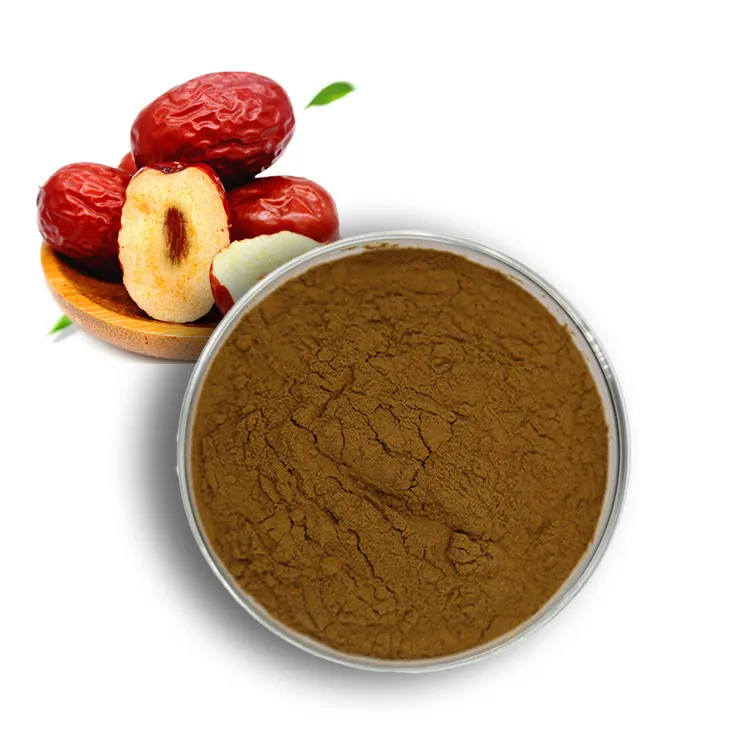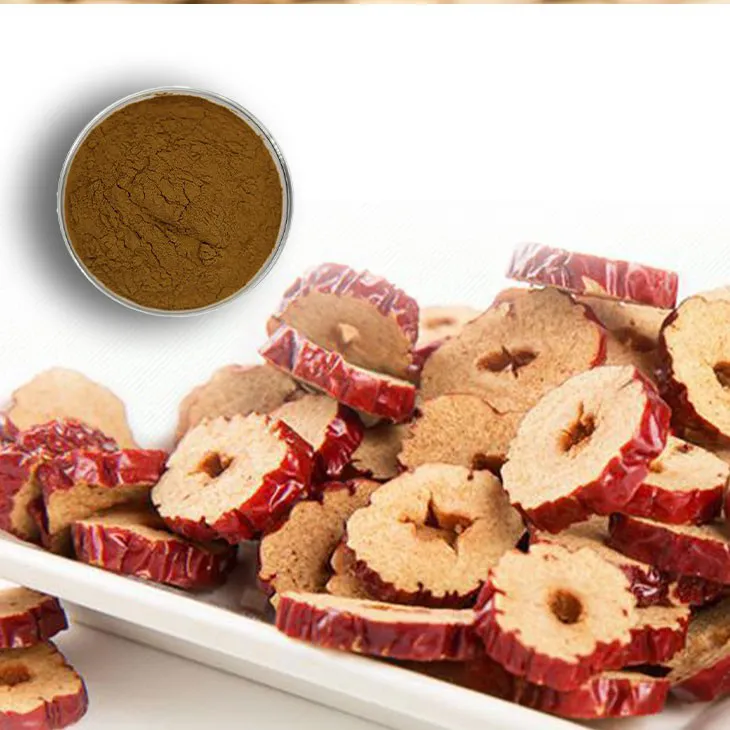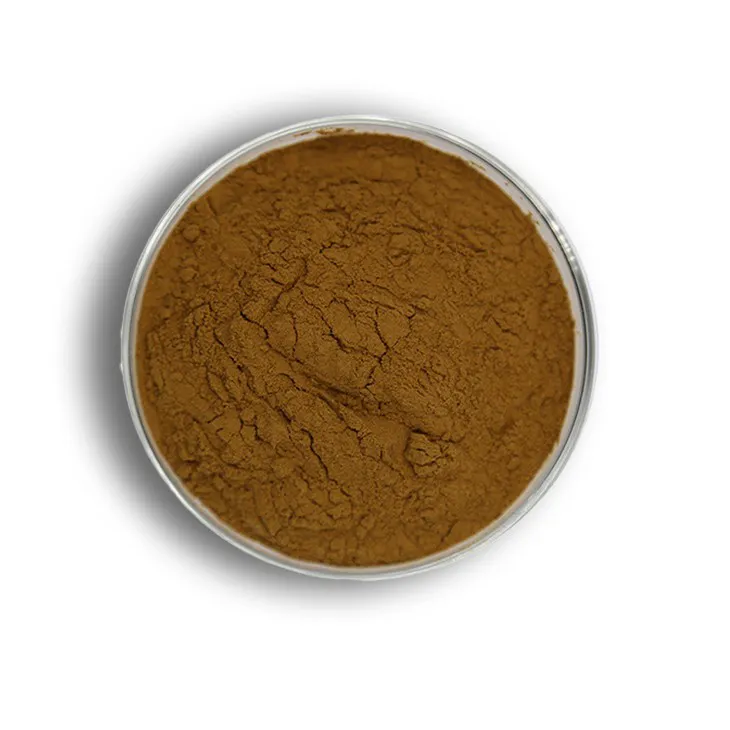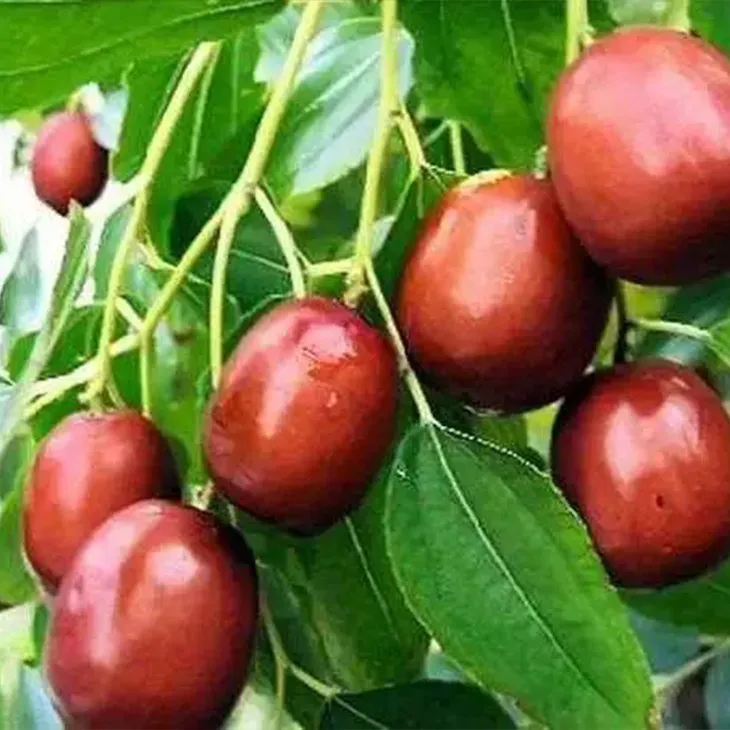- 0086-571-85302990
- sales@greenskybio.com
Active components in jujube extracts.
2024-11-28

1. Introduction
Jujube, a well - known plant species, has been used in traditional medicine and food for a long time. Jujube Extracts are of particular interest due to their potential health benefits. These extracts are rich in a variety of active components, which play important roles in different biological processes. Understanding these components is essential for unlocking the full potential of Jujube Extracts in fields such as medicine, nutrition, and cosmetics.

2. Polysaccharides in Jujube Extracts
2.1 Structure and Properties
Polysaccharides in jujube extracts are complex carbohydrates with diverse structures. They are composed of monosaccharide units linked together through glycosidic bonds. The molecular weight and composition of these polysaccharides can vary depending on the extraction method and the part of the jujube used. For example, some polysaccharides may be rich in glucose, while others may contain a combination of different monosaccharides such as galactose and mannose.
2.2 Immunomodulatory Effects
One of the most significant properties of jujube polysaccharides is their immunomodulatory effects. These polysaccharides can enhance the body's immune system in several ways. Firstly, they can stimulate the production of immune cells such as macrophages, which are responsible for engulfing and destroying foreign invaders.
Research has shown that jujube polysaccharides can increase the phagocytic activity of macrophages, thereby improving the body's defense against pathogens.Secondly, polysaccharides can also regulate the immune response by modulating the production of cytokines. Cytokines are small proteins that play a crucial role in cell - to - cell communication within the immune system. By influencing cytokine production, jujube polysaccharides can help to balance the immune response, preventing over - or under - reactions.

3. Flavonoids in Jujube Extracts
3.1 Types and Sources
Jujube extracts contain a variety of flavonoids, which are a class of polyphenolic compounds. Some common flavonoids found in jujube include Quercetin, kaempferol, and rutin. These flavonoids are mainly present in the peel and flesh of the jujube fruit. The content of flavonoids can be influenced by factors such as the variety of jujube, the growing environment, and the harvesting time.
3.2 Antioxidant Properties
Flavonoids in jujube extracts are well - known for their antioxidant properties. Antioxidants are substances that can prevent or slow down the oxidation of other molecules by scavenging free radicals. Free radicals are highly reactive molecules that can cause damage to cells, proteins, and DNA.
- Flavonoids can neutralize free radicals through various mechanisms. For example, they can donate hydrogen atoms to free radicals, thereby converting them into more stable molecules.
- They can also chelate metal ions, which are involved in the generation of free radicals. By sequestering metal ions, flavonoids can reduce the formation of free radicals.

4. Triterpenic Acids in Jujube Extracts
4.1 Chemical Structures
Triterpenic acids in jujube extracts have unique chemical structures. They are typically composed of a triterpene skeleton with various functional groups attached. These functional groups can influence the biological activity of the triterpenic acids. For example, some triterpenic acids may have hydroxyl groups, which can participate in hydrogen bonding interactions and affect their solubility and receptor binding properties.
4.2 Anti - inflammatory Activity
Triterpenic acids in jujube extracts have been shown to possess anti - inflammatory activity. Inflammation is a complex biological process that is involved in the body's response to injury and infection. However, chronic inflammation can lead to various diseases.
- Triterpenic acids can inhibit the production of pro - inflammatory cytokines such as interleukin - 1β (IL - 1β) and tumor necrosis factor - α (TNF - α). These cytokines play a key role in initiating and maintaining the inflammatory response.
- They can also modulate the activity of enzymes involved in the inflammatory pathway, such as cyclooxygenase - 2 (COX - 2) and lipoxygenase (LOX). By inhibiting these enzymes, triterpenic acids can reduce the production of inflammatory mediators such as prostaglandins and leukotrienes.

5. Saponins in Jujube Extracts
5.1 Classification and Occurrence
Jujube extracts contain saponins, which are a class of glycosides. Saponins can be classified into different types based on their chemical structures. In jujube, saponins are mainly found in the roots, bark, and leaves. The content of saponins may vary depending on the growth stage of the jujube plant.
5.2 Anti - tumor Potential
Some saponins in jujube extracts have shown anti - tumor potential.
- They can induce apoptosis (programmed cell death) in tumor cells. Apoptosis is a natural process that eliminates abnormal or damaged cells from the body. Saponins can activate the apoptotic pathway in tumor cells by regulating the expression of apoptotic - related genes.
- Saponins can also inhibit the growth and proliferation of tumor cells by interfering with cell cycle progression. They can block the cell cycle at specific checkpoints, preventing tumor cells from dividing and multiplying.
6. Synergistic Effects of Active Components
It is important to note that the active components in jujube extracts may not act independently but rather in a synergistic manner.
- For example, the immunomodulatory effects of polysaccharides may be enhanced by the antioxidant properties of flavonoids. Flavonoids can protect immune cells from oxidative damage, thereby improving their function and allowing polysaccharides to exert their immunomodulatory effects more effectively.
- Triterpenic acids and saponins may also work together to enhance the anti - inflammatory and anti - tumor activities. Their combined action may target different aspects of the inflammatory or tumorigenic processes, resulting in a more potent effect.
7. Conclusion
In conclusion, jujube extracts are rich in a variety of active components, including polysaccharides, flavonoids, triterpenic acids, and saponins. These components possess diverse biological activities such as immunomodulatory, antioxidant, anti - inflammatory, and anti - tumor effects. Understanding these active components and their synergistic effects is crucial for further exploring the medicinal and nutritional value of jujube extracts. Future research should focus on elucidating the detailed mechanisms of action of these components, as well as on developing more efficient extraction and purification methods to obtain high - quality jujube extracts for various applications.
FAQ:
What are the main active components in jujube extracts?
The main active components in jujube extracts are polysaccharides, flavonoids, triterpenic acids, and saponins.
What is the function of polysaccharides in jujube extracts?
Polysaccharides in jujube extracts are known for their immunomodulatory effects, which can enhance the body's immune system.
How do flavonoids in jujube extracts work?
Flavonoids in jujube extracts possess antioxidant properties. They can scavenge free radicals and protect cells from oxidative damage.
What are the potential health - promoting effects of triterpenic acids and saponins in jujube extracts?
Triterpenic acids and saponins in jujube extracts contribute to potential health - promoting effects, including anti - inflammatory and anti - tumor activities.
Why is it important to understand the active components in jujube extracts?
Understanding these active components is crucial for further exploring the medicinal and nutritional value of jujube extracts.
Related literature
- Analysis of Bioactive Compounds in Jujube Extracts"
- "The Role of Jujube Extract Active Components in Health Promotion"
- "Research on the Active Substances in Jujube Extracts: A Review"
- ▶ Hesperidin
- ▶ citrus bioflavonoids
- ▶ plant extract
- ▶ lycopene
- ▶ Diosmin
- ▶ Grape seed extract
- ▶ Sea buckthorn Juice Powder
- ▶ Beetroot powder
- ▶ Hops Extract
- ▶ Artichoke Extract
- ▶ Reishi mushroom extract
- ▶ Astaxanthin
- ▶ Green Tea Extract
- ▶ Curcumin Extract
- ▶ Horse Chestnut Extract
- ▶ Other Problems
- ▶ Boswellia Serrata Extract
- ▶ Resveratrol Extract
- ▶ Marigold Extract
- ▶ Grape Leaf Extract
- ▶ blog3
- ▶ blog4
-
Certified organic hawthorn extract.
2024-11-28
-
Bulk purchase of mulberry leaf extract.
2024-11-28
-
Wholesale Suppliers of Eyebright Extract.
2024-11-28
-
Certified organic jujube extract.
2024-11-28
-
The Most Worth - Buying Pure L - Cysteine.
2024-11-28
-
Grapefruit Seed Extract Powder
2024-11-28
-
Tormentil Extract
2024-11-28
-
Curcuma Longa Extract
2024-11-28
-
Rosemary extract
2024-11-28
-
Hericium erinaceus extract powder
2024-11-28
-
Scutellaria Extract
2024-11-28
-
Chaste Berry Extract
2024-11-28
-
Boswellia Serrata Extract
2024-11-28
-
Camu Camu Extract
2024-11-28
-
Citrus bioflavonoids
2024-11-28





















